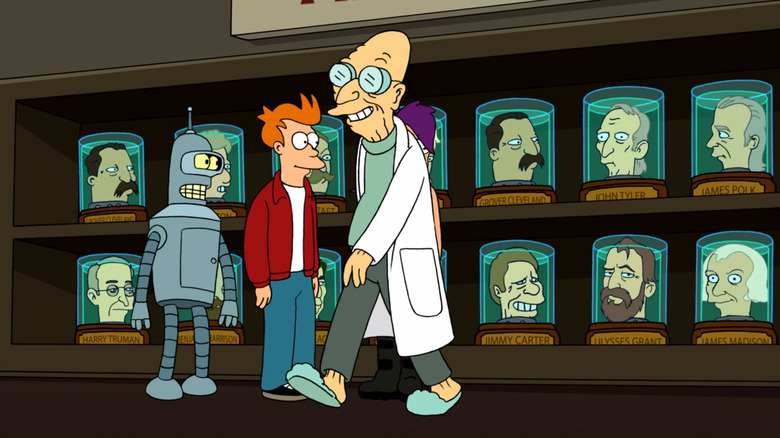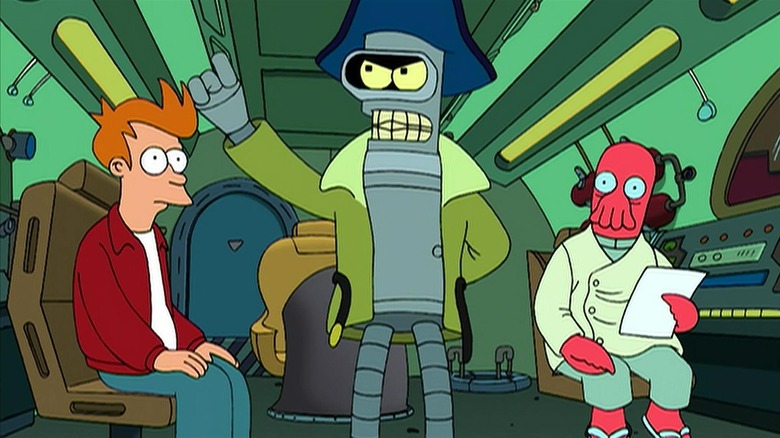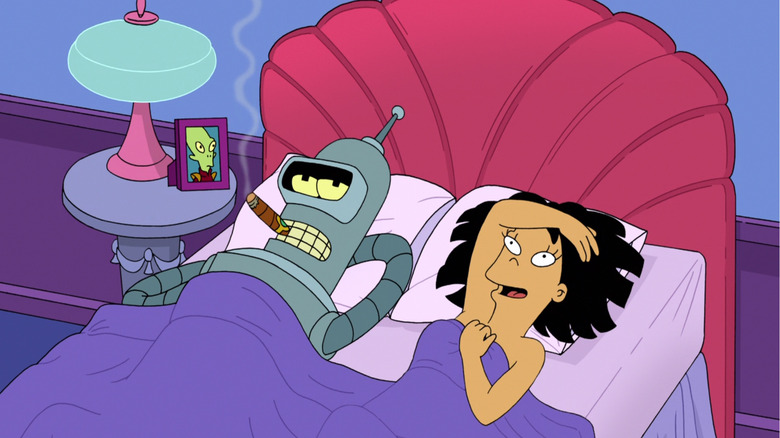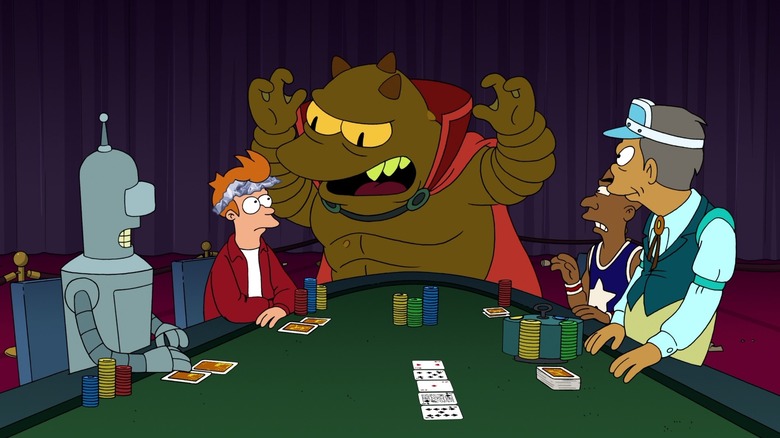How Futurama Found The Right Balance Of Comedy And Sci-Fi
It's important to remember that one can love something and still mock it relentlessly. That seems to be the attitude of Matt Groening and David X. Cohen, creators of "Futurama," in regards to science fiction. The makers of the long-running and seemingly unkillable animated series are clearly intimately familiar with the tropes of the genre, and they appear to be having a wonderful time writing stories of spatial phenomenon, intelligent robots, inter-dimensional travel, and weird space aliens. At the same time, however, the writers also happily send up the tropes of sci-fi, notably the genre's tendency to cover up the fantastical with scientific-sounding technobabble. In the episode "Calculon 2.0," Professor Farnswoth resurrects a dead robot using scientific, mechanical means that — in employing a dead goat, candles in a pentagram, and "protective" black robes — just happen to look exactly like a Satanic rite. In genre fiction, sci-fi technology and outright fantasy can look kind of the same.
"Futurama," then plays as a sci-fi show that is also a satire of sci-fi shows. It finds interesting sci-fi stories to tell, and then goes about deconstructing those same stories. The central joke of "Futurama" seems to be that the future will be a place full of alien cultures and amazing, unimaginable technologies, and despite it all, people will still be kind of petty and doltish.
In a 2015 interview with Lightspeed Magazine, Cohen examined what "Futurama" was doing in terms of genre, and what sort of philosophy he and the other writers affected in order to balance sci-fi with comedy. In terms of percentages, how much should one consider "Futurama" a sci-fi show and a comedy show? These are the shorts of things Cohen had to give serious consideration to.
Welcome to the world of tomorrow
As "Futurama" was in development back in the late 1990s, Cohen recalls pondering just how silly the show ought to be. For instance, should "Futurama" resemble something like "Star Trek," with "actual" spacecraft and a scant underlying "groundedness" to the proceedings? Or should it go full-bore slapstick and resemble a Bob Clampett cartoon wherein physics is sacrificed in the name of a cheap slapstick gag, à la the "Porky in Wackyland" animated short. Ultimately, Cohen selected the former, as the latter, he felt, had the distinct potential of wearing out its welcome, especially in the long run:
"This naturally leads into how we do SF in Futurama, which is, as a funny SF show, is it making fun of science fiction? Or is it real science fiction with jokes in it? We weren't sure ourselves, when we were developing the show. We didn't have a lot of models to decide what we liked best, so we just started fooling around. We did decide pretty quickly that we weren't going to do the real goofy version where there are spaceships that look like flying bicycles. We thought those kind of visual jokes would wear thin; if you had to see a dumb-looking ship 1,000 times, it wouldn't be funny the 832nd."
"Futurama" will, very occasionally, feature a "flying bicycle" type gag however. In a time travel episode, Fry (Billy West) has to fly a tiny one-man vessel into a dangerous area. The vessel happens to look like a Little Tikes Crazy Coupe. Sometimes the temptation to make a cheap sight gag is too much to resist.
Thank heaven for little nerds
In terms of feedback, Cohen was more or less working blind in the early days of "Futurama." Because animated shows take so long to make, a lot of time could elapse from first writing to final airing. As such, Cohen just had to confidently go with his own instincts, balancing sci-fi and comedy as best as his intuitions would permit, before he could see which element that the show's viewers were responding to. Once feedback finally started flowing in, Cohen could see that the audience was more enamored of the science parts:
"As far as the tone, we weren't sure if people would watch if it was more serious [sci-fi], and the feedback loop is very slow in animation; we would do a show that would take a year to make, and then read comments on the internet and start writing a new show, and that's one a year later. But we noticed that the fans were responding well to the episodes that had more science fiction in them, and if you watch the series again — which I encourage everyone to do — you'll see we go for more serious [sci-fi] stories as it goes along."
The first season of "Futurama," while perfectly entertaining, did feature more spoof episodes and character-based stories than sci-fi conceits. It was the first season that involved tracking down a rare can of anchovies, for instance. And there was an episode wherein Leela (Katey Sagal) started her belligerent relationship with one Zapp Brannigan (also Billy West). In the final episode of the show's first season, the characters visit the facility where their favorite addictive soda, Slurm, is manufactured, just like in "Willy Wonka and the Chocolate Factory." Not something one would necessarily see on "Star Trek."
The bubble of tension
Cohen eventually discovered that "Futurama" has the ultimate straight man written into its DNA: the world itself. If "Futurama" took place in a more straightforward (if slightly absurd) sci-fi universe, it would provide a great opportunity for silliness to come along and deflate everything. Like salt on a caramel, the sci-fi elements served to enhance the flavor of the comedy rather than overwhelm it. It seems that it was not merely a balance of sci-fi and comedy, but a perfect marriage of the two. Cohen said:
"The thing that was surprising to me, and the other writers I think, was that a lot of those ended up being our funnier episodes as well, and that's what we didn't know that we could do at first; a real science fiction story, but also a comedy or touching story. The reason it worked is that having this grand, melodramatic background for the SF story sets up this bubble of tension that you can pop with the jokes, and the jokes actually end up playing better."
The peculiar blend of sci-fi and comedy in "Futurama" garnered a passionate cult audience that continued to bolster the show throughout several cancelations on several networks over the years. The show, however, is clever and rich enough to face yet another resurrection: New episodes are set to air on Hulu in 2023. Whether or not the studio heads had to sacrifice a robot goat and wear black robes in order to resurrect has not yet been revealed.



